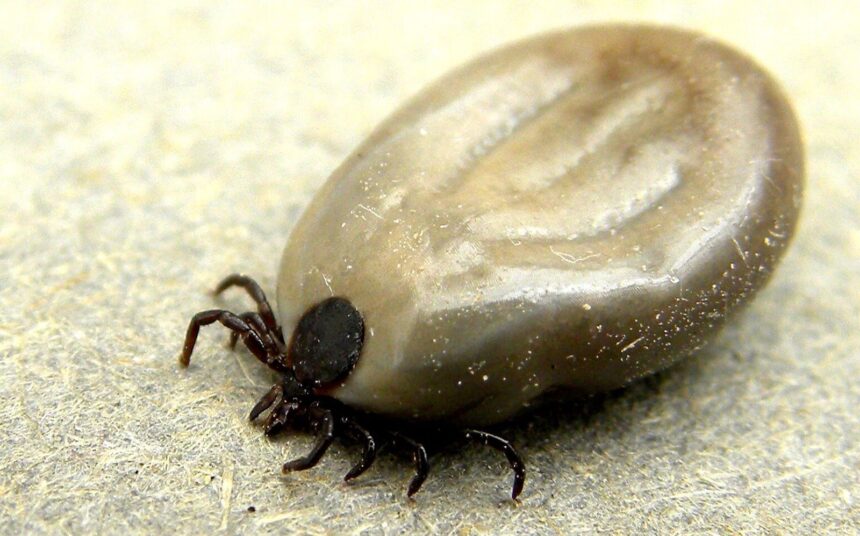Published Jun 16, 2025 • Last updated 15 hours ago • 4 minute readAn engorged female deer tick. Photo by Griffin Dill /University of MaineColleen MacInnis is seeing an uptick in people coming to her Shelburne pharmacy for tick assessments.Over the weekend, MacInnis, the owner and pharmacist of TLC Pharmacy, saw close to 20 people concerned about potential tick bites.“It’s definitely something that we are seeing many times every day,” said MacInnis. “The word is out that pharmacists look at the ticks and help people with the prophylactic doses and that we can assess for some of these tick-related rashes. More people are heading to the pharmacies to get treatment.”THIS CONTENT IS RESERVED FOR SUBSCRIBERS ONLY.Subscribe now to access this story and more:Unlimited access to the website and appExclusive access to premium content, newsletters and podcastsFull access to the e-Edition app, an electronic replica of the print edition that you can share, download and comment onEnjoy insights and behind-the-scenes analysis from our award-winning journalistsSupport local journalists and the next generation of journalistsSUBSCRIBE TO UNLOCK MORE ARTICLES.Subscribe or sign in to your account to continue your reading experience.Unlimited access to the website and appExclusive access to premium content, newsletters and podcastsFull access to the e-Edition app, an electronic replica of the print edition that you can share, download and comment onEnjoy insights and behind-the-scenes analysis from our award-winning journalistsSupport local journalists and the next generation of journalistsRegister to unlock more articles.Create an account or sign in to continue your reading experience.Access additional stories every monthShare your thoughts and join the conversation in our commenting communityGet email updates from your favourite authorsSign In or Create an AccountorArticle contentMacInnis knows firsthand the importance of being on the front line to offer help for those concerned with tick bites. Eight years ago, her son, seven at the time, was diagnosed with Lyme disease from a tick bite.“Before we knew as much as we know now, his symptoms would likely have been caught a little sooner,” said MacInnis. “At that time we weren’t necessarily seeing prophylactic doses after bites, we weren’t seeking treatments based on rashes or waiting for blood work. So he went a long time without being diagnosed.”MacInnis said her son ended up with arthritis, which cleared up in about a year and a half, and he is now a healthy teenager.She has seen an increase in patients this year seeking a diagnosis.Read More Ticks are getting worse in Nova Scotia. Here’s what you need to know JOHN DeMONT: Dispatches from Nova Scotia’s tick central Acadia tick researchers see promise in lemongrass essential oil as a repellent “Whether or not that is because there are more ticks and tick bites or there is more education around where to access treatment, or more education around the fact that you can get a prophylaxis for a specific tick bite, I’m not entirely sure, but our numbers are definitely up over last year.”Article contentMacInnis said the pharmacy was busy over the weekend, which showed the concern people have.“Most of them were coming in first thing in the morning as our doors open, so the level of concern is high enough that people are taking time from their sunny weekend to head in to see us,” said MacInnis.“It makes it easier for me to relate to people who are really concerned about it because it can really affect people’s lives. More and more people are seeing people around them being affected by this. It’s very scary for them.”Tick adviceSuzanne Richards-Aucoin, a community pharmacist since 2008 who now works for the Pharmacy Association of Nova Scotia, said Nova Scotia is considered a high- to moderate-risk area for tick-related issues.Richards-Aucoin said she has heard through conversations with pharmacists that tick assessments are on the rise. She stressed the importance of getting an evaluation at a pharmacy.Article content“As we all know, pharmacists are the most accessible health-care professionals, that’s why we promote going to a pharmacy for this type of assessment,” said Richards-Aucoin.“About a year ago, pharmacists can not only do prophylaxis after a tick bite preventing Lyme, but we also are able to assess for early Lyme. So if you have been bitten and now all of a sudden it could be 30 days and you have a rash, that’s a symptom of early Lyme disease. We are able to assess and treat for that.”The following are some frequently asked questions about ticks.Will a pharmacist remove a tick from my skin?Pharmacists do not remove ticks.How do I safely remove a tick?Carefully grab the tick with tweezers as close to the skin as possible; gently and slowly pull the tick straight out of the skin; don’t jerk, twist or squeeze it.Clean the area of the bite with soap and water or alcohol hand sanitizer once you’ve removed the tick.Article contentWhat should I do with the tick after it is removed from my skin?It is helpful for the pharmacist to assess a tick bite. You should bring the tick in a sealed container like a plastic bag or pill bottle to the pharmacy.How do I check for ticks?You should check yourself and your family for ticks.Have a bath or shower within two hours of coming inside (this makes it easier to spot ticks and wash off unattached ticks).Check around ears, behind knees, in hair, between the legs and in the groin area and around the waist.RelatedWhat are the signs of a tick-borne illness?You may not notice a tick bite right away. No matter how long the tick was attached, be sure to watch for signs and symptoms of tick-borne illnesses. Symptoms may appear in stages or over time.Article contentrash (sometimes shaped like a bull’s eye)fever or chillsnausea and vomitingfatiguemuscle achesjoint painheadachesHow can I reduce the risk of getting a tick on me?Check your clothing and body carefully for ticks after spending time outside.Wear long pants and long sleeves when in areas likely to have ticks.Wear light-coloured clothing (light colours make it easier to see ticks).Wear enclosed shoes and tuck pants into socks.Walk on well-travelled paths, avoiding long grass and vegetation.Apply insect repellents approved by Health Canada to exposed skin and clothes (following directions carefully).Where can I find more information about tick safety?You can call 811 or the Nova Scotia Health Tick Hotline at 902-266-7199 or 1-866-266-7199.Article content
N.S. pharmacist sees increased tick worry, early screening growth











